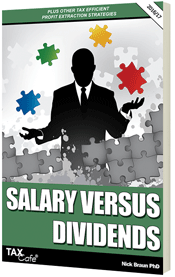Transferring Shares to Save Tax
Save Income Tax by Transferring Shares to a Spouse or Partner
WHERE A company is owned and managed by a couple, they may each be able to withdraw a tax-free salary of up to £7,605 and tax-free dividends of up to £31,383 in the current 2012/13 tax year: potentially providing them with total tax-free income of up to £77,976.
But what if your spouse or partner isn’t involved in the business, for example if the company was started before you met, or if they have a separate career?
In situations like these, it may still be possible to save income tax by gifting shares in the company to them.
Capital Gains Tax
In the case of married couples, a transfer of shares would be exempt from capital gains tax. In the case of unmarried couples, any transfer of shares in the business would be treated as if a sale has taken place at market value. However, the couple can elect to claim holdover relief – if the company is a trading company.
Giving the Business Away
It is essential that proper beneficial ownership of shares in the company is handed over. It is also safer to transfer ordinary shares rather than shares that may have fewer rights, e.g. preference shares.
How Much of the Business Should Be Transferred?
For many company owners, a 50:50 ownership split with their spouse or partner will prove optimal, but a smaller stake can be transferred if the founder wants to retain more control over the business.
Example
Steve owns 100% of Steve’s Spices Ltd, a small trading company. Steve currently pays himself a salary of £15,000 and cash dividends of £75,000 per year (gross dividends of £83,333).
His total taxable income is £98,333, which means he is close to the £100,000 threshold where he will start to lose his income tax personal allowance.
He currently pays income tax of £12,568 on his dividend income (£98,333 - £42,475 x 22.5%).
Steve’s wife Lara does not own any shares in the company, but she does receive rental income of £9,000 from some buy-to-let properties. At present, £33,475 of her basic-rate band is not being used (£42,475 - £9,000). This means she could receive cash dividends of up to £30,128 tax free (£33,475 x 0.9).
Steve therefore transfers 40% of the ordinary shares in the business to Lara. The company continues to pay total dividends of £75,000 but now Steve’s cash dividend is £45,000 and Lara’s is £30,000.
Because Lara’s income will still be below the higher-rate threshold, she does not pay any income tax on her dividend income.
Steve’s total taxable income is now £65,000, made up of gross dividend income of £50,000 and salary income of £15,000. He now pays income tax of £5,068 on his dividends (£65,000 - £42,475 x 22.5%).
The tax on the couple’s total dividend income has therefore been reduced by £7,500.
Furthermore, Steve’s income is now well below the £100,000 threshold which means he doesn’t have to worry about losing his income tax personal allowance for now.
It is important to point out that an ownership split that is optimal in one tax year may not prove optimal in a future tax year, for example if there are changes to tax rates and thresholds, or if the couple’s personal circumstances change, such as where one of them starts receiving more income from other sources.
Spouse Has No Taxable Income
This is the ‘bread and butter’ scenario. The company owner is a higher-rate taxpayer; the spouse is a ‘house-spouse’ with no job and no other taxable income.
The spouse can receive gross dividends of up to £42,475 tax-free in 2012/13 (£38,228 cash dividends). The maximum potential tax saving is £9,557 if the other spouse is a higher-rate taxpayer (£38,228 x 25% or £42,475 x 22.5%).
Spouse is a Basic-Rate Taxpayer
Another potentially common scenario: The company owner is a higher-rate taxpayer; their spouse has some taxable income but is a basic-rate taxpayer (income under £42,475 in 2012/13).
For example, let’s say your spouse already has taxable income of £30,000 from other sources. They can receive gross dividends of up to £12,475 tax-free in 2012/13 (£11,228 in cash dividends). The potential tax saving is £2,807 (£11,228 x 25%).
If the company owner is an additional rate taxpayer (with total income over £150,000), the potential tax saving would be £4,054 (£11,228 x 36.11%).
Spouse is a Higher-Rate Taxpayer
In this situation, both partners have taxable income of more than £42,475 (2012/13 figures), so paying dividends to a spouse will only produce a tax saving if the original company owner pays income tax on dividends at more than 25%: for example, if their income exceeds £150,000.
HMRC’s Attacks on Income Shifting
HMRC has tried to attack income splitting arrangements in recent years using the so-called settlements legislation. It all came to a head in the notorious ‘Arctic Systems’ tax case.
The judges decided that the settlements legislation could not be applied because the couple were protected by an exemption for gifts between spouses. It also helped that ordinary shares were involved (rather than, say, preference shares which have fewer rights).
For this reason, many tax advisers are of the opinion that married couples should continue to split their dividend income with their spouses while they can (some sort of income shifting legislation could eventually be introduced that will undo this type of tax planning).
Unmarried Couples & Other Family Members
Although HMRC was defeated in the Arctic Systems case, the taxpayers only won the case thanks to the exemption for gifts between spouses.
There is now uncertainty as to where this leaves income-splitting arrangements between other groups of individuals, in particular, unmarried couples.
However, to date, the taxman has not pursued these individuals aggressively so, again, it may be a case of making hay while the sun shines.
To protect against any potential attack, the best defence is probably to have both individuals equally involved in the business.









